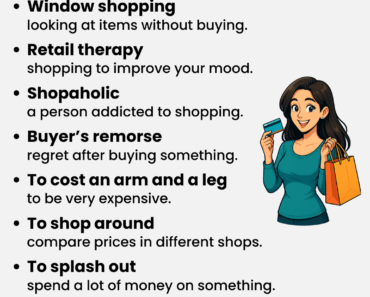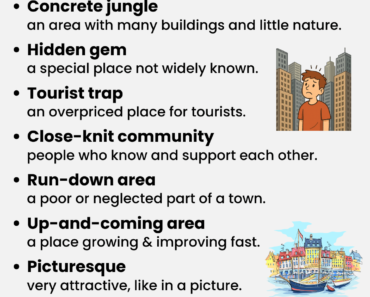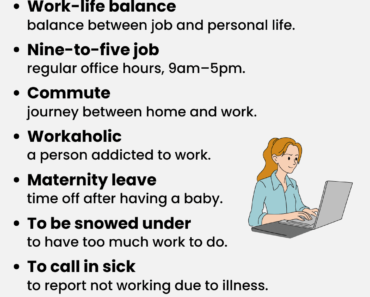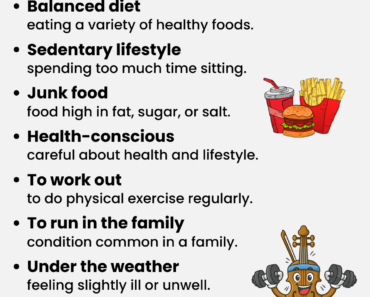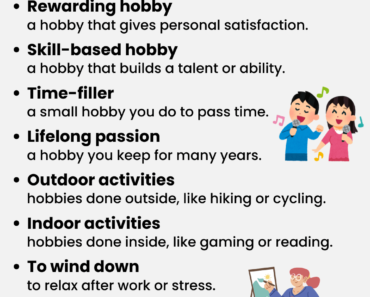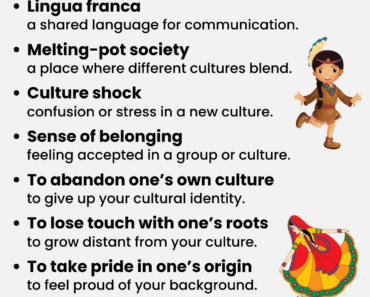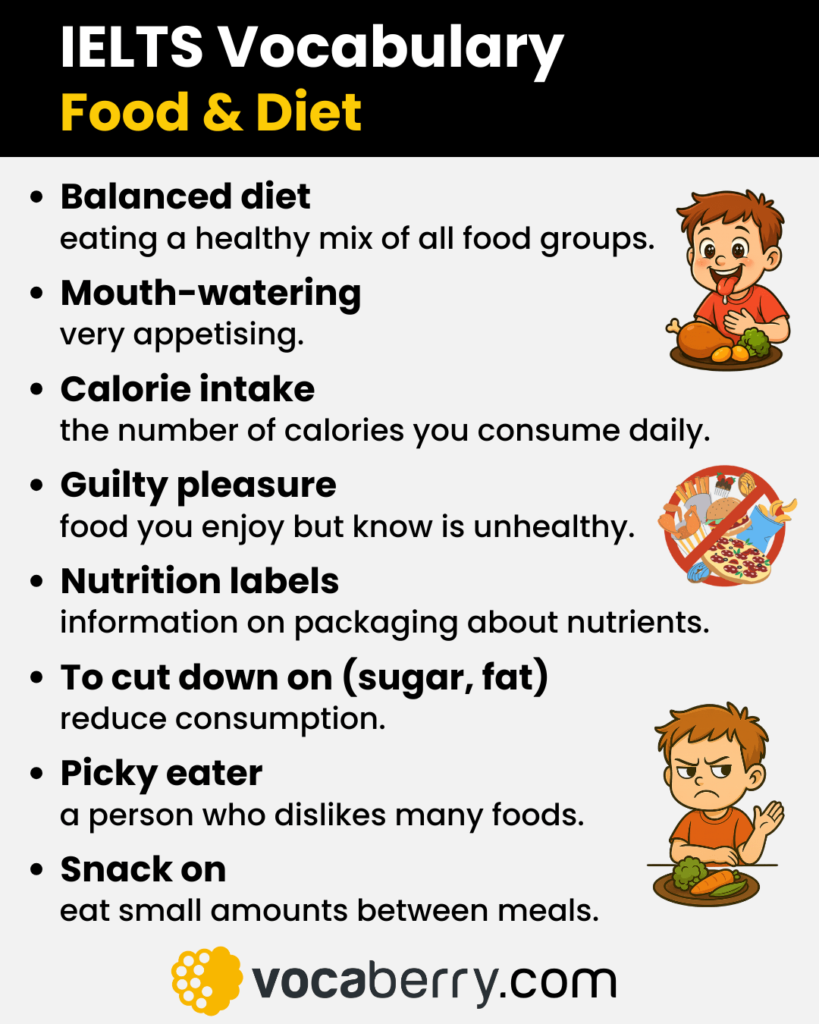
Food and diet is one of the most common IELTS Speaking topics. In this guide, you’ll find a list of useful IELTS vocabulary for food and diet with clear definitions, followed by real IELTS Speaking Part 1, Part 2, and Part 3 questions and sample answers. These examples will show you how to use the vocabulary naturally and help you prepare more effectively for the IELTS Speaking test.
IELTS Vocabulary for Food & Diet
Here is some useful IELTS vocabulary for food and diet with definitions. These words and phrases are helpful for IELTS Speaking answers.
- Balanced diet – eating a healthy mix of all food groups.
- Calorie intake – the number of calories you consume daily.
- Portion control – managing the size of servings you eat.
- Intermittent fasting – eating only during certain hours of the day.
- Late-night snacking – eating food late in the evening or before bed.
- Snack on – eat small amounts between meals.
- Cravings – a strong desire for specific food.
- Guilty pleasure – something you enjoy but know is unhealthy.
- Cheat meal – an indulgent meal as part of a diet plan.
- Watch what you eat – be careful about your diet.
- Everything in moderation – all foods are okay if not excessive.
- Mindful eating – eating slowly and being aware of food.
- Emotional eating – eating to deal with stress or feelings.
- Food diary – a record of what you eat each day.
- Picky eater – someone who dislikes many foods.
- Adventurous eater – someone who likes trying new foods.
- Foodie – a person very interested in food and cooking.
- Savoury tooth – someone who prefers salty/spicy food.
- Health-conscious – careful about eating healthy food.
- Junk-food addict – someone who eats too much unhealthy food.
- Big eater – someone with a large appetite.
- Light eater – someone who eats small portions.
- Whole foods – natural, unprocessed foods.
- Processed food – packaged food with additives.
- Food intolerance – difficulty digesting certain foods.
- Vegan diet – no animal products, including meat, dairy, and eggs.
- Vegetarian diet – no meat, but may include dairy and eggs.
- Gluten-free diet – excludes foods with wheat/gluten.
- Dairy-free diet – excludes milk and dairy products.
- High in fat/sugar/salt – containing large amounts of these elements.
- Empty calories – food with energy but little nutrition.
- Nutritional value – how healthy food is in terms of nutrients.
- Nutrient-dense food – food with lots of vitamins and minerals compared to calories.
- Sugar-laden – containing a lot of sugar.
- Calorie-dense – small portion with high calories.
- Obesity – medical condition of being extremely overweight.
- Malnutrition – poor health from lack of nutrition.
- Hydration – maintaining enough water in the body.
- Mouth-watering – looks or smells delicious.
- Rich – heavy and full of flavour.
- Light – easy to digest, not heavy.
- Hearty – filling and satisfying.
- Wholesome – healthy and good for the body.
- Nutritious meal – food that is healthy and full of nutrients.
- Fattening – food that causes weight gain.
- Sugar-free – food without added sugar.
- Greasy – containing too much oil.
- Crispy – firm and crunchy.
- Juicy – containing a lot of natural liquid.
- Tender – soft and easy to eat.
- Crunchy – hard and makes noise when chewed.
- Bland taste – food without strong flavour.
- Fine dining – high-class, expensive restaurant experience.
- Split the bill – share the cost of a meal.
- Go halves – each person pays half.
- Hit the spot – exactly what you wanted.
- To tuck into – eat eagerly and with enjoyment.
- To wolf down – eat very quickly.
- To pick at my food – eat without appetite or interest.
- To cook up a storm – prepare a lot of food or cook very well.
- Work up an appetite – become hungry after activity.
- Eyes bigger than your stomach – take more food than you can eat.
- Have a sweet tooth – really enjoy eating sweet foods.
- Not my cup of tea – something you don’t like or enjoy.
- Treat myself – allow yourself to enjoy something nice.
- Eat like a horse – eat a lot.
- Eat like a bird – eat very little.
- Packed with flavour – very tasty.
- Takeaway food – food bought from restaurants to eat elsewhere.
- Eating out – having meals at restaurants.
- Low-carb diet – eating fewer carbohydrates.
- To whip up a meal – quickly cook something simple.
- To season food – add salt, spices, herbs.
- To cut down on (sugar/fat) – reduce consumption.
- Cut out junk food – completely stop eating junk food.
- To be a fussy eater – someone who doesn’t like many foods.
- To dine in / dine out – eat at home / eat in a restaurant.
- Ready meals – pre-prepared food.
- To go on a crash diet – try to lose weight very quickly.
- Leftovers – food that remains after a meal and is kept to eat later.
- Nutrition labels – information on packaging about nutrients.
- Go-to dish – a favourite or reliable meal you always choose.
- Spice it up / tone it down – make food more or less spicy or flavorful.
- Free-range eggs – eggs from hens kept outdoors in natural conditions.
- Beverage – any drink, usually non-alcoholic.
- Cuisine – a style of cooking typical to a country or region.
- Buffet – self-service meal with many dishes.
- Walk-in – arriving at a restaurant without booking.
- To go on a diet – start eating less or healthier to lose weight.
- To get into shape – to become fit and healthy through diet and exercise.
- To slim down – to lose weight and become thinner.
IELTS Speaking: Food & Diet Questions & Answers
In this section, you’ll find IELTS Speaking Part 1, Part 2, and Part 3 questions on food and diet with sample answers. They show how this vocabulary can be used naturally in the exam.
IELTS Speaking Part 1 – Food & Diet
Do you prefer eating at home or eating out?
I usually prefer eating at home because I can control my portion sizes and focus on whole foods. But from time to time, I enjoy eating out, especially if I want to try a different cuisine or just grab a quick bite with friends.
How often do you eat fast food?
Not very often, to be honest. I try to be health-conscious and mostly avoid junk food or processed foods. Still, I allow myself the occasional cheat meal, which feels like a little guilty pleasure.
Do you usually eat a lot of food?
I wouldn’t say I’m a big eater. I generally practice mindful eating and try to remember that everything in moderation is the key to staying healthy.
Do you think your diet is healthy?
Yes, I’d say my diet is fairly healthy. I try to follow a balanced diet, include plenty of vegetables, and avoid food that is high in fat or sugar. Sometimes I even keep a food diary to check my calorie intake.
Do you usually have breakfast?
Yes, I try not to skip breakfast because it gives me energy for the day. Usually, I go for something light but nutritious, like yoghurt, fruit, or eggs. On busy mornings, I might just snack on a cereal bar.
Do you like trying new kinds of food?
Yes, I’m quite an adventurous eater. I love exploring different cuisines, and sometimes I even treat myself to a fine dining experience, though on a daily basis I keep things simple.
IELTS Speaking Part 2 – Food & Diet Cue Card
Describe a memorable meal you had.
You should say:
- when and where it was
- who you had it with
- what you ate
- and explain why it was memorable.
Sample Answer:
One of the most memorable meals I had recently was my mum’s birthday dinner about two months ago. We don’t usually go for fine dining, but my dad booked a cosy place in town that’s popular with foodies for its locally sourced dishes.
I arrived a bit peckish and started snacking on warm bread and olives from a small buffet. For the main, I chose grilled chicken with roasted vegetables. It was tender, juicy, and packed with flavour, a wholesome and nutritious meal, not the greasy food you sometimes get when eating out. I try to watch what I eat and keep my calorie intake under control, but that night I decided to treat myself to dessert. The chocolate cake was my guilty pleasure, rich, sugar-laden, and definitely fattening, but it really hit the spot. I joked that my eyes were bigger than my stomach because I felt absolutely stuffed afterwards.
What made the evening special wasn’t only the food; it was the atmosphere. We rarely manage a full family dinner, so it was lovely to sit together, split the bill, and enjoy everything in moderation. It reminded me that food isn’t just about portion control, it’s also about celebration and connection.
IELTS Speaking Part 3 – Food & Diet Discussion
Do you think people today eat healthier than in the past?
Not really. In the past, people relied more on whole foods and home-cooked meals. Today, many people eat too much processed food and have a higher calorie intake, often without realising it because they don’t check nutrition labels. Of course, there is more awareness of a balanced diet nowadays, but overall I think modern lifestyles encourage junk-food habits.
How has fast food affected people’s diets in your country?
Fast food has definitely made people’s diets less healthy. It’s cheap, convenient, and often packed with flavour, but usually it’s very greasy, sugar-laden, or high in salt. Many young people treat it as a regular meal rather than an occasional cheat meal, which leads to problems like obesity and malnutrition from lack of proper nutrients.
Why do you think some people follow special diets, like vegetarian or gluten-free?
There are different reasons. Some people choose a vegetarian diet or a vegan diet because of their beliefs, while others follow a gluten-free or dairy-free diet for health reasons, such as food intolerance. I think it also reflects how people today are more health-conscious and willing to change their eating habits to suit their lifestyle.
Do you agree that people should avoid eating meat?
I don’t think avoiding meat completely is necessary. Meat can be part of a nutritious meal if eaten with portion control and balanced with vegetables. What really matters is everything in moderation. Personally, I think people should cut down on fattening or processed meat, but a diet with lean meat can still be healthy.
How can governments encourage people to eat more healthily?
Governments can do a lot. They could require clear nutrition labels on food, regulate junk food advertising, and support public health campaigns about mindful eating and the dangers of yo-yo dieting. They can also make whole foods and organic produce more affordable so people don’t always choose ready meals or fast food.
More IELTS Vocabulary Topics
If you found this lesson useful, explore other IELTS Speaking topics to expand your vocabulary and practice with sample answers:
- IELTS Vocabulary: Accommodation
- IELTS Vocabulary: Advertisement
- IELTS Vocabulary: Animals
- IELTS Vocabulary: Art
- IELTS Vocabulary: Artificial Intelligence
- IELTS Vocabulary: Books
- IELTS Vocabulary: Childhood
- IELTS Vocabulary: Crime and Punishment
- IELTS Vocabulary: Culture and Traditions
- IELTS Vocabulary: Daily Routine
- IELTS Vocabulary: Education
- IELTS Vocabulary: Environment
- IELTS Vocabulary: Family
- IELTS Vocabulary: Fashion and Clothes
- IELTS Vocabulary: Films
- IELTS Vocabulary: Friends
- IELTS Vocabulary: Gifts
- IELTS Vocabulary: Health
- IELTS Vocabulary: Hobbies
- IELTS Vocabulary: Hometown
- IELTS Vocabulary: Money
- IELTS Vocabulary: Museums
- IELTS Vocabulary: Music
- IELTS Vocabulary: Plants
- IELTS Vocabulary: Shopping
- IELTS Vocabulary: Social Media
- IELTS Vocabulary: Sports
- IELTS Vocabulary: Technology
- IELTS Vocabulary: Transport
- IELTS Vocabulary: Travel
- IELTS Vocabulary: Weather
- IELTS Vocabulary: Work & Jobs

